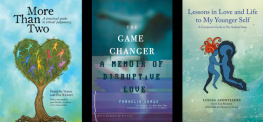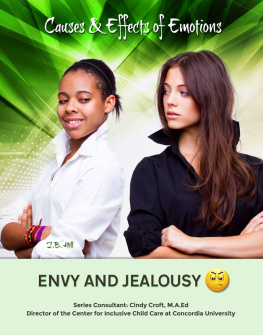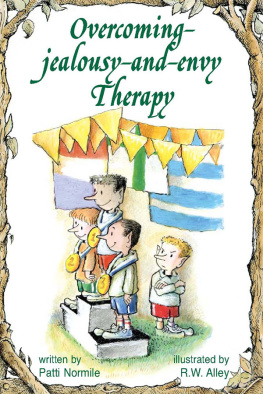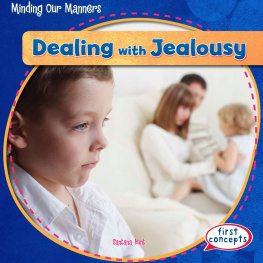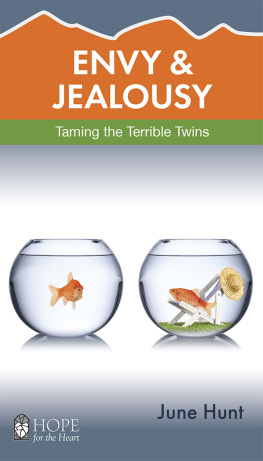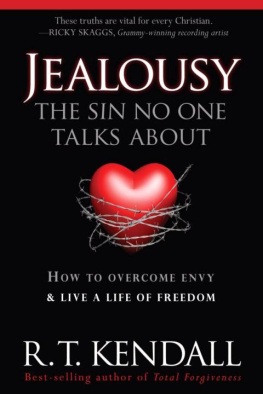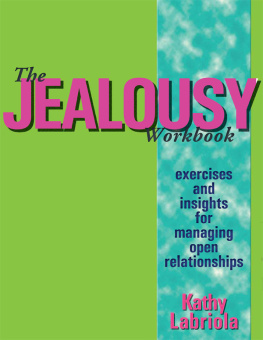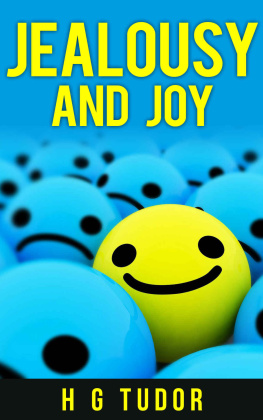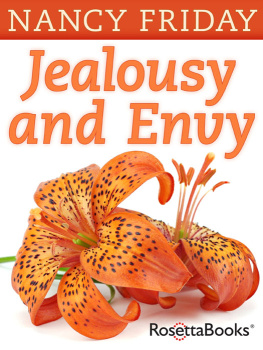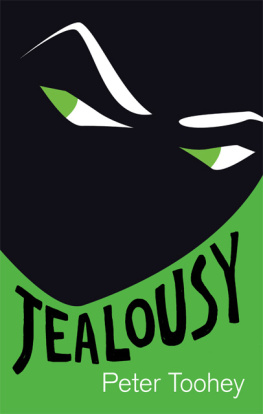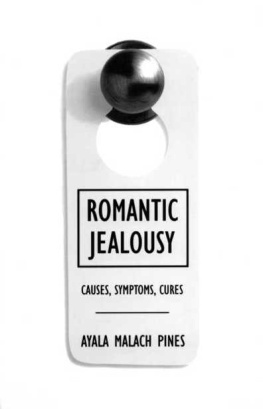Polyamory and Jealousy
A More Than Two Essentials Guide
Eve Rickert and Franklin Veaux

Polyamory and Jealousy
A more than two essentials guide
Text copyright 2016 by Eve Rickert and Franklin Veaux
All rights reserved. No part of this book may be used or reproduced in any manner whatsoever without written permission from the publisher except in the case of brief quotations in critical articles and reviews.
ePub edition v1.0
Thorntree Press, LLC
PO Box 301231
press@thorntreepress.com
Cover and ebook design by Amy Haagsma
Copy-editing by Roma Ilnyckyj
ISBN: 978-1-944934-00-2
The worst thing about jealousy is how low it makes you reach.
Erica Jong
Its been just over a year since the official publication of More Than Two: A Practical Guide to Ethical Polyamory, our 500-page manual on the ethics, emotions and practicalities of plural relationships. In that time, the book has sold about 20,000 copies, and weve heard dozens of stories of the personal and relationship transformations its brought about. Were amazed, humbled and more than a little stunned by the overwhelming response to the book.
But we wanted to reach more people than just those who feel up for a 500-page deep dive. Although we designed More Than Two as a reference book, so you could jump straight in to the chapters you need most, we wanted a way to give people what they need in a more bite-sized formatas well as an easy entry point into the book. And so More Than Two Essentials was conceived. The idea: Release key chapters from More Than Two, revised and with new material, focused on particular problem areas. The obvious topic to start with was jealousy.
Weve learned a lot in the past year, talking to hundreds of people at conferences and on our book tour. Weve learned about some things we left out, and some things we got wrong. This booklet is adapted from chapter 9 of More Than Two, but weve trimmed and added, revised and reworded, and tried to make the chapter even more relatable to a wider range of people. The most important change is that we try to speak more directly to the at-times overwhelming emotional experience of jealousyand to the fact that people who experience it are not aloneand attempt to separate the need for self-care, support and reassurance during the jealous experience from the cognitive work and communication that needs to come after.
We hope this work helps you on your journey.
THE GREEN-EYED MONSTER
So youre in a polyamorous relationship; youre involved with someone who has another partner. There you are, cruising along, and wham! You see something, or hear something, or think about something, and now youre in the thick of it. Jealousy. It happens, sometimes when we least expect it. When it does, we can feel like we want to set fire to the world before running into a dark cave, screaming I will never let anyone get close to me ever again! (Or maybe thats just us.)
We give such talismanic power to jealousy that the fear of it alone can shape our relationships. Weve never heard anyone say, Polyamory? I wouldnt want to do that. What if I feel angry? or What if I feel sad? But many people say, Polyamory? What if I feel jealous? The fact is, at some point you will. Few people are born immune to jealousy. The good news is, jealousy is just an emotion, like any other emotion. Sometimes you feel sad, sometimes you feel angry, but you dont let those feelings define you. They dont run your life. Jealousy doesnt need to either.
WHAT IS JEALOUSY?
Jealousy is the feeling we get when we drag tomorrows rain cloud over todays sunshine. Its the feeling that we are about to lose something important to us, including maybe our self-worth, to someone else. Its the fear that we arent good enough, that the people around us dont really love us, that everything is about to turn to ash. It comes like a thief in the night, stealing our joy. Jealousy is a sneaky thing. It sits behind us whispering that we are the victim, not the villain: that the people around us are wronging us, and we must act to protect ourselves. And perhaps most destructively, it tells us not to talk openly about the way were feeling. It thrives on secrecy and silence. At its most toxic, it makes us angry at others and ashamed of ourselves at the same time.
Jealousy wears many faces because, unlike surprise or fear or anger, it is built of many emotions. Insecurity, fear of loss, territoriality, inadequacy, entitlement, poor self-esteem, fear of abandonmentall these can pile onto one another to make different versions of what we think of as jealousy.
Is jealousy an intrinsic part of human nature? Some folks say yes, some no. We say it doesnt matter. We feel what we feelbut there is a difference between jealous feelings and jealous actions. Regardless of the origin of jealous feelings, the actions we take are our responsibility.
Jealous feelings come from a sense of loss, or a fear of it. Jealous actions are usually attempts to take back control over the things were afraid of. For example, if you feel jealous when your partner has sex with her new partner in the Monkey with Lotus Blossom and Chainsaw position, you might be afraid that youre losing something special: Thats our position! What if this new person handles the chainsaw better than I do? What does she need me for, now that shes found someone else to do this with?
The jealous action might be to say, I dont want you to have sex with anyone but me in this position, which is an attempt to deal with the fear by taking back control. If she stops doing this, I wont feel replaced anymore! At least until the next threatening thing comes along.
Those kinds of actions dont create safety or security. Rather, safety and security come from knowing that your partner loves, trusts and values you. Putting controls on your partners behavior, or other jealous maneuvers like invading privacy or criticizing a metamour, wont give you this knowledge. They do exactly the oppositethey undermine intimacy by telling your partner that you dont trust her.
THE CHAMELEON EMOTION
Sometimes jealousy can be a relatively simple emotion, easy to detect and recognize. This is especially true when it happens in response to clear triggers, like watching a partner kiss another partner. The first time Eve saw her husband, Peter, holding hands with his first poly girlfriend, Clio, the lurching feeling of the ground dropping out from beneath her feet was an unmistakable sign of jealousy. It was impossible to interpret as anything else, and the stimulus responsible for it was clear. That made the feeling, as scary as it was, relatively straightforward to confront.
But one of the things that can make jealousy such a challenge is that its a shape-shifter: jealousy masquerades as other emotions. Before you can fight it, you need to see it for what it is. Some of the emotions that can have jealousy at their root are fear, loneliness, loss, sadness, anger, betrayal, envy and humiliation. If you are feeling these in connection to one of your partners or metamours (your partners other partners) and theres no obvious reason, or if the emotion is much stronger than the situation would seem to warrant, ask yourself if it might be jealousy.
On the other hand, those same emotions can arise in response to a genuinely hurtful external situation. In those cases it can be too easy to blame jealousy, and thereby duck the real issues. Its reasonable to ask yourself, Am I really having these emotions just because Im feeling jealous? Take heed if a partner or metamour frequently minimizes your emotions as just jealousy. Do you feel you are being listened to? Are you being offered genuine insight about yourself by someone who knows and cares about you? Or are you being belittled and dismissed?
Next page
